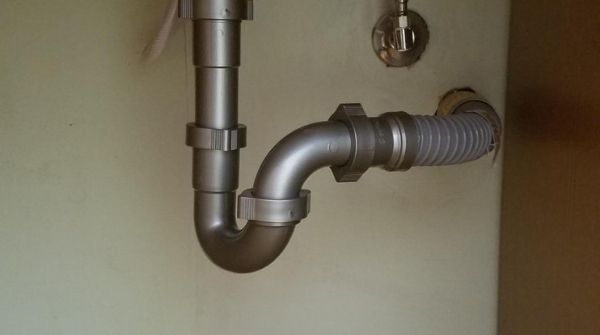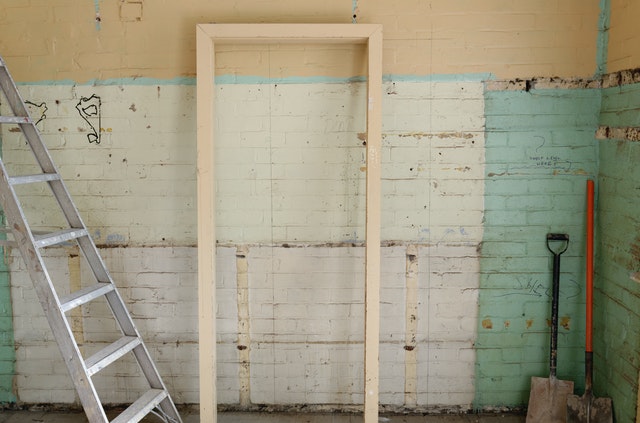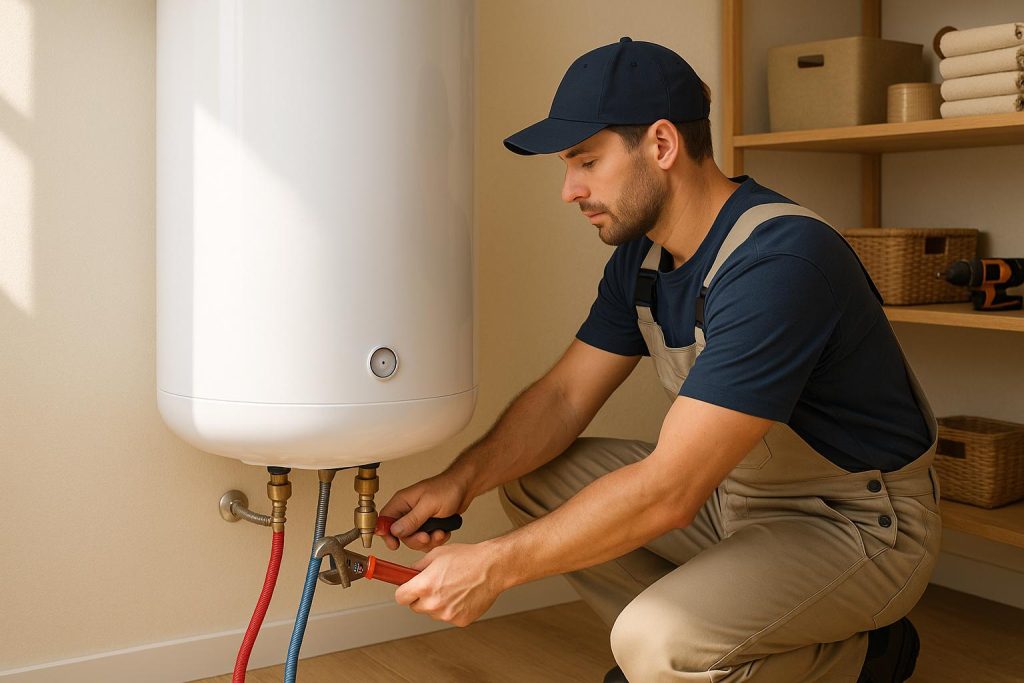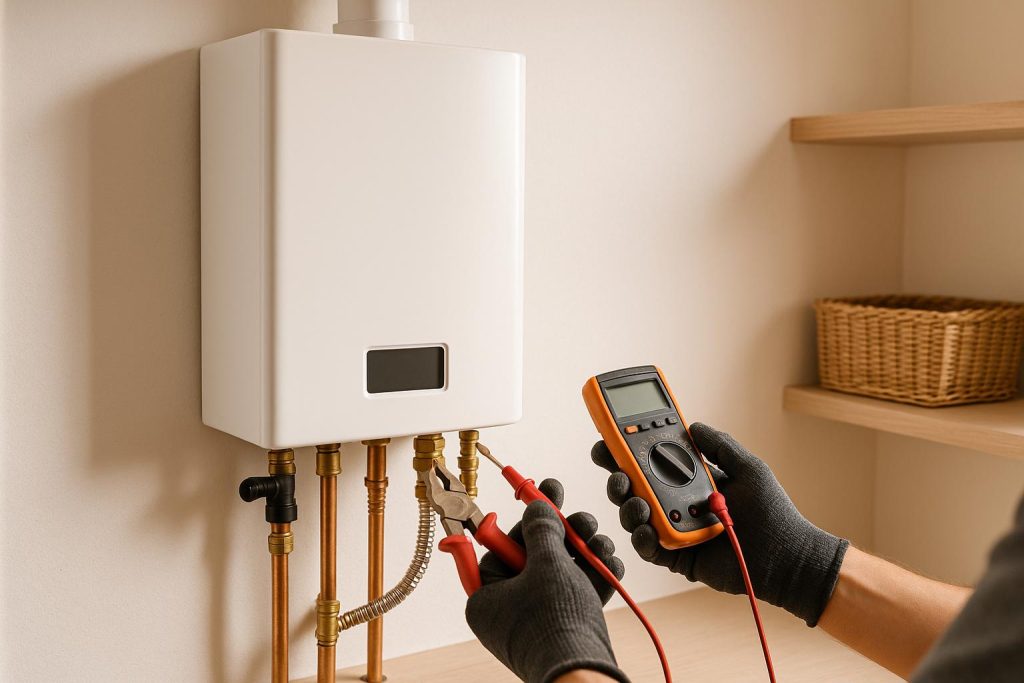A sulfur/rotten eggs smell in the house is a sign of presence of hydrogen sulfide gas. It is an absolutely horrible odor that you cannot live with and will need to be fixed as soon as possible.
A sulfur smell in the house can be dangerous or not dangerous at all depending on what is causing it. Hydrogen sulfide gas in work places is usually very dangerous but the one found in most homes isn’t, unless you are dealing with leaking natural gas or a toxic drywall.

A sulfur/rotten eggs smell in the house is usually a sign of leaking natural gas, dry drain traps, leaking sewer line, sulfur-rich well water or magnesium anode rod in the water heater. If your house was built in the 2000s, the smell could be from the drywall when most of them were imported from China with a very high sulfur content.
To eliminate the sulfur smell in your house, first ensure that that you do not have leaking natural gas. Next check whether the smell is coming from any of your drains, or from water faucets. If the smell is coming from faucets, go ahead to check if it is coming from the cold or hot water faucets, or both.
Anytime you suspect that there is natural gas leaking from your house vacate the premises and immediately call your gas supplier or fire department. The natural gas in your house is deliberately mixed with mercaptan which smells like sulfur/rotten eggs to make it detectable when it leaks.
In this post, I will provide a quick summary and a long guide to this problem. Let us start with the brief summary:
Causes Of Rotten Eggs in the House
- Sewer Gas: Sewer gas can infiltrate your home through drain traps or plumbing leaks, creating a foul odor. Dry P-traps or damaged plumbing seals are often responsible.
- Natural Gas Leaks: If you have a natural gas supply to your home, a sulfur-like smell can indicate a gas leak. Gas leaks are dangerous and require immediate professional intervention.
- Water Heater Issues: A malfunctioning water heater can produce hydrogen sulfide gas when the anode rod reacts with sulfate in the water, causing a rotten eggs smell in hot water.
Solutions
- Check and Fill P-Traps: Ensure all sink, shower, and floor drain P-traps have water in them to create a seal that prevents sewer gas from entering your home. Pour water into dry traps to reseal them.
- Inspect for Plumbing Leaks: Regularly inspect your plumbing for leaks and damage. Replace worn-out or damaged seals, gaskets, or pipes to prevent sewer gas infiltration.
- Address Water Heater Issues: If the smell is limited to hot water, it may be due to a reaction in the water heater. Replace the anode rod with an aluminum or magnesium one to reduce the reaction causing the odor.
- Natural Gas Leak: If you suspect a natural gas leak, immediately evacuate your home, avoid any open flames or sparks, and call your gas company or emergency services. Do not attempt to fix a gas leak yourself; it requires professional assistance.
How Do You Get Rid of Sulfur Smell in Your House?
The method to use to get rid of sulfur smell in your house will depend on what is causing it in the first place. Except in instances where the smell is caused by leaking natural gas, getting rid of the rotten eggs smell from your house is a fairly easy process.
Start looking at the various ways of troubleshooting and getting rid of a hydrogen sulfide gas smell in your house.
1. Vacate House with Leaking Natural Gas

Many homes in the United States use natural gas or liquid propane (LP) to fire up the furnace, oven, stove, water heater and other appliances. While it is very convenient, natural gas is very dangerous as it can result in an explosion when it comes into contact with a fire source or electrical spark.
Natural gas or liquid propane have no distinct smell or taste. To help homeowners easily detect it when there is a leak, the utility companies inject it with a substance known as mercaptan or methaneniol which smell like sulfur/rotten eggs or rotten cabbages.
Apart from the rotten eggs smell, how else can you tell if you have natural gas leaking in your house?
Signs Natural Gas is Leaking in Your House
- A hissing sound – A hissing sound is a sign that natural gas is leaking in your house at very high pressure. The fact that you can hear it leak means that your entire house is full of it. That is a very dangerous situation and you will need to leave your house immediately. Don’t try to fix it.
- Dying house plants – House plants thrive in fresh air. If natural gas is taken up by the plants instead of oxygen and carbon dioxide, you will notice that their health will start to deteriorate and if the leak continuous the plants will die off eventually.
- Unusual pet behavior – If you have dogs, cats or other pets in the house, they will react differently to a natural gas leak. This change of behavior include lack of appetite, lethargy, vomiting among others.
- Yellow pilot flame – Your furnace pilot should burn blue at all times. When instead you notice a yellow or orange flame, it means there is insufficient oxygen, and carbon monoxide will be produces as a result.
The rule of thumb is to always call the utility company or fire department when your house exhibits the signs of a leaking natural gas. Teach everyone in your house this signs. For more information check out this post.
2. Replenish a Dry P-Trap
Each of the fixtures in your house has its drainpipe. All the drainpipes are interconnected and drain into the main sewer line that exits the house. A problem with one drainpipe is therefore likely to affect the entire house.
A vertical pipe called a vent stack is connected from the main house sewer line and runs through the roof of the house. It takes out the sewer gases and also allows free circulation of air inside the entire plumbing helping the fixtures drain efficiently.
To make sure that the sewer gases indeed exit the drainpipe through the vent stack and not sink/toilet/bathtub or other drains in the house, plumbers usually install a P-trap on each drain. But what is a P-trap?

A drain’s P-trap is the U-shaped pipe which looks like an inverted P that is always installed just below each fixture with a drain. It at all times hold a little amount of water that acts as a barrier preventing bad smells from coming up in the house.
If you have a sulfur smell in your house, there is a very high likelihood that one of the fixtures in the house has not been used for a while. This results in drying of the water in the P-trap allowing gases to freely flow through it.
Often this smells comes from bathrooms that are rarely used like the guest/basement bathroom, or laundry room where the washing machine is used probably once in a week. Gunk collecting in the washing machine’s rubber door seal, water filter or in the drainpipe can cause a rotten eggs smell in the house or laundry room.
The solution to this problem is usually the easiest one. Let your nose guide you to where the smell is the strongest. Most of the time this will be in a bathroom or laundry room. A kitchen or bathroom sink will often be the most affected ones since they also have gunk trapped in the trap.
All you have to do is restore the water that has evaporated from the P-trap. Just turn on the drain faucet and let it run for a few seconds. You will notice that the sulfur smell will stop immediately.
Whenever you come home from vacation make it a point to always run water through all drains just in case one P-trap has dried up. Do not forget to flush all toilets as well. Most people will also experience a sewer smell in the house when they have not been for a while.
Bacteria present in the gunk trapped in the P-traps could also start breaking down the gunk and in the process emit a horrible smell in the house. Cleaning the P-trap (especially kitchen sink, bathroom sink, shower/bathtub drain and washing machine drain) will help remove this smell.
Here is how to clean a drain trap and get rid of the sewer/sulfur smells:
- Pour 1 cup baking soda down the drain.
- Slowly add 1 cup of vinegar. I insist on slow since baking soda reacts with vinegar rapidly.
- Let the solution sit for 30 minutes, breaking up the gunk.
- Blast hot water down the drain to wash down everything.
- Repeat once every month.
3. Test Your Well Water

More than 10 million households in the United States use water from a well. It is not unusual to have a sulfur smell in your well water but some areas are more affected than others.
Hydrogen sulfide which occurs naturally in the ground as a result of decomposition of organic matter dissolves in the water leading to the rotten eggs smell when you open your faucets. If the sulfur smell comes in when you are running a faucet (hot and cold) the cause of the smell is most likely the well water.
To be sure that the source of the smell is indeed the well water, refrain from using the water in your house for 6 to 8 hours. Preferably do this overnight. This will give the gases enough time to build up inside the pipes.
After the 6-8 hours, plug off a sink and turn on the cold water faucet. Let it fill with water up to the half level mark. If the water in the sink has a strong sulfur/rotten eggs smell then you definitely have hydrogen sulfide dissolved in your well water.
Should you want a confirmation test, there is 2 ways to go about it. You can buy a water-testing kit and do the test on your own or you can send a sample of the water to your area’s extension office and have their water experts analyze it for you.
Once the results are out and it is confirmed that without a doubt the source of the sulfur smell in your house is the well water, there are a few things you can do to get rid of it. They include:
- Hypochlorite treatment – This involves shocking the well with chlorine (ordinary household bleach) usually every 6 months. You can also install a peroxide injection system with a backwashing carbon filter.
- Air Charger sulfur treatment – These filters removes sediments from the well water through natural aeration with an optional peroxide rinse. This is usually a better alternative than the standard carbon filters which tends to trap sediments, lowering the water pressure in the process. These systems on the other hand backwash trapped sediments, preventing pressure drop. For more information check out the Clean Water website who are specialists in this field.
- Install and under-the-sink reverse osmosis unit – A licensed plumber can also install a reverse osmosis unit with carbon filters under your sink to remove the sulfur odor from your well water. The installation should be done properly otherwise your RO unit will start fouling as well.
4. Replace the Water Heater Anode Rod
If you notice that the sulfur smell in the house comes on only when a hot water faucet is running, you most likely have a problem with your water heater. This is regardless of whether you are using well water or the municipal water.
Inside your water heater is a rod called an anode. Often this rod is made from magnesium. It is also called a sacrificial anode since it sacrifices its life for that of the water heater.
In essence, the anode is installed to extend the lifetime of the water heater. Instead of elements present in the water attacking and corroding the inner lining of the water tank, they instead attack and corrode the anode rod instead.
Replacing the anode is usually easier and cheaper than replacing the water heater. While the magnesium anode does a great job in extending the life of the water heater, it is often responsible for the sulfur smell in hot water.
How does that happen though? Sulfates present in the water react with the magnesium rod and in the process hydrogen sulfide gas is produced. This is the sulfur/rotten eggs smell you notice when you turn on the hot water faucet.
To fix this problem, you will need to replace the magnesium rod with an aluminum/zinc one. Aluminum/zinc water heater anodes are able to protect and extend the lifetime of the water heater without production of hydrogen sulfide gas.
Replacing a water heater’s anode rod is a fairly easy task, but you need to be careful. Turn off the heat source to the water heater (electricity or natural gas) and drain the heater up to about the ¾ level.
Look for the anode rod plug at the top of the water heater and loosen it with a wrench. Remove it and replace it with a new one.
If you are not confident about doing it on your own please call in a licensed plumber. Read more on how to fix sulfur smell in water in this post.
5. Replace the Off-Gassing Drywall
If your house was built or remodeled in the 2000s (2001-2009), there is a high probability that you bought a drywall imported from China. These drywalls had an excessive amount of sulfur which cause an off-gassing rotten eggs/sulfur smell in your home.
The drywalls were imported from China after a series of hurricanes which saw a demand of the same go up, forcing importation from China. It now looks like quality control was not a thing that the manufacturers paid enough attention to.

Apart from the sulfur smell, other tell-tale signs that you are dealing with a toxic Chinese drywall include:
- Air conditioning systems failing often and early. This is as a result of corrosion of electrical copper wires by the drywall. You will notice a black coating on the wires.
- Oven/stove heating elements and refrigerator coils failing.
- Failure of displays on electrical devices likes TVs and microwaves.
- Bulbs burning out way too fast.
Apart from the smell and failure of appliances, the high levels of sulfur in the drywalls have a negative impact on the overall wellbeing of the residents.
Fixing these problem is quite expensive. There is no other way to go around it rather than replacing the drywall. This will cost the homeowner thousands of dollars. Call your insurance agent to see what options are available for you.
6. Inspect your Sewer Line
A sulfur or rotten eggs smell outside the house is often caused by broken sewer line or septic tank. It could also be caused by leaking natural gas so you also need to be very careful about it.
Tree roots in your property could force their way through a small crack on a sewer line, widening it with time. The tree roots clogs the sewer line and could also cause the sewer line to leak and in the process emit foul smelling gases.
If you are on a septic system the smell could also be coming from the septic tank or drainage field. Unfortunately this is hardly something you can fix on your own.
Call in a professional plumber and let them find the fault in your plumbing.





